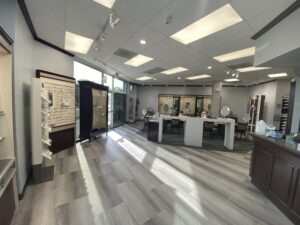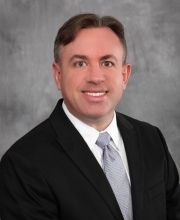
Dr. Holler, front, center, with his practice team. Dr. Holler says he worked with his team to correct mistakes that were hindering service to patients and profitability.
Practice management mistakes to turn around and transform patient care and profitability.
By David Holler, OD, FAAO, FSLS
August 23, 2023
Making mistakes is part of life, and an important way we learn to do better. Practice ownership is no different. Here are a few management mistakes we turned around to create a better-run optical, ensure we treat all employees equally and prevent unplanned exits of the doctors we employ.
Giving Opticians Too Much Independence in Frame Vendor Decision-Making
New vendors were coming into our optical and making side agreements with our opticians that I was not privy to. Our opticians were receiving personal gift cards when purchasing large orders. This created a multitude of issues, including excessive under-stock, overpaying for frames and opticians serving themselves above the patient and the practice. This way of doing business also created a rift between opticians who received the gift cards and those who didn’t.
I disciplined the team members involved, returned all of the frames they procured on their own and told the vendors they were no longer welcome in any of our locations.
Correcting this mistake showed our team how important it is to serve the patient first and practice second. We want to always ensure our patients are getting honest service that is unbiased by personal gain. Any gifts given to the office are now for the office and not one individual. We then can turn those rewards into something that benefits the team rather than one person.
After terminating three opticians and disciplining two others who had made side deals on their own with vendors, we hired new optical employees and increased frame sales by 30 percent in one year.
We have better team rapport now. Happy team members comes through in our service to our patients.
By avoiding reps desperate to sell to us we have built stronger relationships with key vendors by giving them more board space.
Independent doctors who own their business must always integrate themselves in all aspects of the practice. It is nice to delegate some parts of the business to people whom you trust – but I can assure you – when not managed correctly, it opens the door to problems. You must meet any vendor you are doing business with and clearly state your objectives.
Giving an Employee a Credit Card to Use for Incidentals on a Business Trip
This mistake led to an abuse of privilege. The business meeting had all expenses paid by the sponsor. The only need for incidental expenses should have been for a cab or car service, perhaps snacks for the flight or hotel room and other small extras. Instead my credit card showed food delivery expenses averaging $35 per meal for three meals per day. There were also expenses at gas stations an hour away from the hotel and airport.
I no longer give a credit card to employees going on a business trip. Instead, I set clear guidelines and expectations and agree to reimburse appropriate expenses after they return. Doing it this way lessens the chances of team members taking advantage of the business and privileges they have been granted.

Dr. Holler’s optical. He says that treating all employees equally, so that they work together as a true team has made a big difference to patient care and practice success.
Never giving an employee access to one of my credit cards also results in fair and equal treatment of all employees. Hopefully that garners more team loyalty. Loyal employees are more likely to go the extra mile for us in their work, including in meeting practice goals like increasing sales of Transitions Lenses and helping us grow our myopia management services.
After paying all of the expenses to send someone to the Transitions Academy, we ultimately increased Transitions sales by 3 percent.
There are many excellent training programs available. We must be selective in which employees we send as a representatives of our practice. We must also create expectations for these individuals before sending them off for training. We don’t want them to feel it’s a chance to engage in indulgent behavior at our expense. We want them to see these trips as opportunities to learn to serve patients better and grow in their career.
Relying on Handshake Agreement with Employed OD
I once had a handshake agreement with a part-time doctor in our practice. It was understood that they would not have an employment agreement with us until they became a full-time associate.
After a few years of this doctor working part-time, we were ready to make them a full-time associate. Instead, they decided to leave (with very little notice) to work in a new commercial eyecare location a couple miles away.
Other Articles to Explore
We now require an employment agreement for any full- or part-time doctor before they see any patients in our practice. We have a clear, written understanding of what an associate should expect from us and what we expect of them.
Patients now know that our office is the place to come to if they want care from the doctors we employ. They won’t see the same doctor from our office working down the street at a corporate chain store. We invest fully in our associates by immersing them into our community of patients.
I can only be as good as the people working in our office. We need to be unified in our commitment to the practice.
I know that new graduates usually don’t want to be tied down to one practice. They often try to avoid contracts and restrictive covenants, but they should realize that a properly structured employment agreement protects both parties. If everything is communicated properly in the agreement, then practices will feel much more comfortable investing in promoting their new doctor. The doctor, owner and patients should all benefit in the end.
We went from being a 1.5 doctor practice to having five doctors – all working under an employment agreement.
 David Holler, OD, FAAO, FSLS, is President of Clarity Vision of Apex in Apex, N.C. To contact him: dholler@findclarityvision.com
David Holler, OD, FAAO, FSLS, is President of Clarity Vision of Apex in Apex, N.C. To contact him: dholler@findclarityvision.com

























